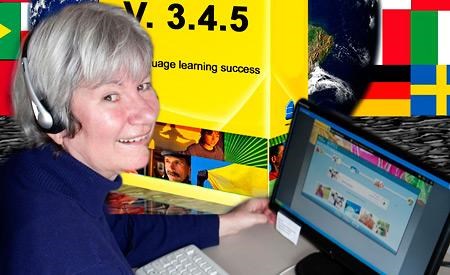Anybody who has visited another country and had the opportunity to converse with someone, but not had the language skills needed to do so, can feel the motivation to take up a second or third language. But it can be difficult to learn another language without being immersed in it—which is challenging in a place where English is spoken almost exclusively, like Powell River.
Some people take language classes, or hire a tutor to help them practice. However, the popularity of online language learning software is increasing, and since February 2012 Powell River Public Library has been offering public access to the Granddaddy of language-learning software: Rosetta Stone TotalE.
This new service has been a big hit, says Jomichele Seidl, assistant chief librarian. “One hundred and sixty-six people have used the program since we launched it 12 months ago. We purchased 10 licences using grants from Powell River Friends of the Library and IslandLink Library Federation. Those licences have all been in continuous use.”
Whether or not a person travels, there are many reasons to learn another language, including maintaining brain health. “Research shows conclusively that acquiring a second language helps stave off the effects of Alzheimers,” Seidl says.
Rosemary Austerman is a patron who has been using Rosetta Stone to learn Spanish since the library started offering it.
“I go to Mexico and other Spanish-speaking countries quite a bit, but I also do it to exercise my brain,” she says. “Rosetta Stone is great. It’s really flexible and positive, and the best part is that you can do it whenever you want, for however long. There’s no pressure to go to a class, and it’s really well set up for learning.”
Rosetta Stone is well-known as language-learning software that works, but there is a big drawback—the price. It costs several hundred dollars to buy the program, which is one reason why Austerman appreciates the opportunity to access it for free through the library.
“I hadn’t used Rosetta Stone before the library got it,” she says. “I had heard of it, and I was thinking of buying it, but because it’s not cheap I didn’t want to invest a bunch of money until I knew I was really committed to using it. Being able to access it through the library is a great way for people to try it out.”
The feedback the library has been getting about this recent service is overwhelmingly positive. “People love it,” Seidl says. “Many who have tried Rosetta Stone out through the library had previously tried taking language classes or using CD sets, but couldn’t make significant headway. With Rosetta Stone’s TotalE, their pronunciation is monitored and corrected from day one, and they are amazed at how quickly and easily they progress.”
The program can be used not only by English speakers interested in learning another language, but also by people who are learning English as their second language.
It’s a very natural, organic way to learn a language, Seidl says. “It is not an academic approach; in fact there is virtually no ‘instruction.’ I believe the process is very similar to the way a baby acquires language. It’s very visual, and gradually increases in complexity.”
Rosetta Stone focuses on total immersion. For English speakers learning another language, no English is used in the instruction. Instead, learning is achieved through pictures, association and a variety of other methods. The TotalE program includes not only the basic online course, but also the opportunity to set up a class time with a tutor and a few other students to practice speaking in the language. There are games to participate in, stories to read aloud to get feedback on pronunciation, and more, all of which can be done from a user’s home.
“The program gradually introduces you to more and more difficult language,” Austerman says. “You eventually have to get to the point where you’re not translating from English into the language you’re learning. Instead, you’re just thinking in that language.”
There are 30 languages available through the library’s Rosetta Stone service, and Latin American Spanish and French are by far the most popular, Seidl says. “But we also have people studying Greek, Italian, Turkish, Mandarin Chinese, Latin, Portuguese and Irish.”
People interested in giving it a try, can send an email to [email protected] and include their name, library barcode number, the language they want to learn, and their native language.
The offering of Rosetta Stone is one example of how the library is evolving to embrace new technologies and exciting new ways to learn.
“Like other modern libraries,” Seidl says, “we help bridge the ‘digital divide.’ We offer technology, resources and support, that enable our users to explore the full range of information that is out there in the ever-expanding cyber world.”
Emma Levez Larocque is Literacy Outreach Coordinator for Powell River.



